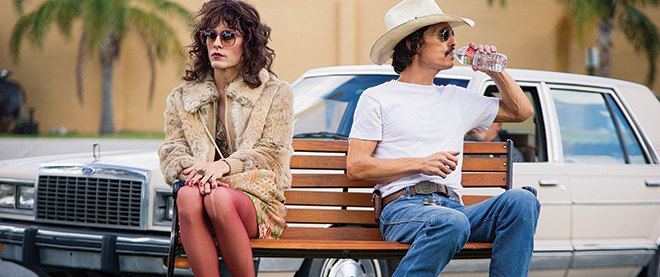Jean-Marc Vallée is going Hollywood, minus the budget
A Quebec auteur’s U.S. film may cement his career—and Matthew McConaughey’s
Share

Traditionally, there have been two kinds of Canadian directors: those who work in the underfunded trenches of homegrown cinema, and celebrated Hollywood emigrés such as James Cameron, Ivan Reitman and Paul Haggis. Traffic between the two camps is rare. When a Canadian indie director does get lured by Hollywood, it often comes with a catch—you get a big budget, a city block of trailers and a helicopter shot, only if you’re willing to suffer a proportionate loss of creative freedom. But Quebec’s Denis Villeneuve has just debunked that notion with Prisoners, a $60-million studio movie that he swears he made with a free hand—it’s one of the year’s most acclaimed films. Now another Quebec auteur, Jean-Marc Vallée, shatters the rest of the “selling-out” cliché with Dallas Buyers Club, proving that going Hollywood is not always about the money.
This deeply American movie, which is creating Oscar buzz for actor Matthew McConaughey, was shot for a mere $5 million. That made it cheaper than either of Vallée’s last two Canadian features, C.R.A.Z.Y. and Café de Flore, which cost $7 million and $11 million respectively. Originally, Vallée had tried to finance Dallas Buyers Club as an $8-million Canadian production. But it lacked the domestic talent to qualify for government funding. “The Canadian investors got scared,” he says. “They’re not used to making films without public money.” So Vallée looked south, and scored his breakthrough with his most frugal budget in almost two decades, and a shooting schedule jammed into 25 days.
Set in Texas but filmed in New Orleans, Dallas Buyers Club is based on the true story of Ron Woodroof (McConaughey), a rodeo cowboy with a macho swagger who became an unlikely AIDS activist during the 1980s. We meet him as a boozing hellraiser whose idea of heaven is sharing his bed with two women and three lines of coke. Woodroof’s world comes crashing down in 1985 when he’s diagnosed with HIV, likely contracted from his closeted bisexual trysts. First he is in violent denial, bragging he’s no “faggot,” while chasing black-market doses of AZT with beer and cocaine. But with a prognosis that he has just a month to live, he buries himself in research and begins to fight his disease with the tenacity of a bull-rider.
Setting himself up as a one-man drug cartel, he imports large batches of unapproved medicine from Mexico, and creates a “buyers club” to help AIDS victims. With an ailing junkie queen as his business partner (Jared Leto), Woodroof becomes a local hero to the gay community, and a passionate crusader against Big Pharma and the FDA. He also prolongs his own life by seven years. The script is based on 20 hours of interviews that screenwriter Craig Borton conducted with him the week before he died.
With echoes of Midnight Cowboy, the film pivots on two stellar performances that find the sweet spot between flamboyant wit and gravitas. McConaughey and Leto shed some 80 lb. between them to appear sufficiently emaciated. But Vallée didn’t film it like a Hollywood movie. Using Quebec cinematographer Yves Bélanger, he shot handheld with available light. That afforded a 360° view of the actors. With no breaks between shots to re-light the set, he could work more fluidly. And without the heat of the lights, he says, actors forget they’re on a set. “They don’t feel they’re acting.”
But Vallée found one source of Hollywood heat invaluable—McConaughey’s star power. “For the first 20 minutes, Matthew’s character is a total asshole,” he says. “So how come, after five minutes, the audience cares for him? It’s not the acting. It’s the face and the humanity and the star quality of this guy.” Ever since a 1996 Vanity Fair cover introduced McConaughey as the next big thing, this long, tall Texan has scrambled to live up to the billing, while his career turned into a talk-show punchline. But last year, he set his beefcake image ablaze with an incendiary role as a stripper in Magic Mike. And now, finding redemption as a cowboy joker who has to get serious, he’s finally stepped up to the A-list—with a hand from a Quebec director who has taken his own back road to the big time.